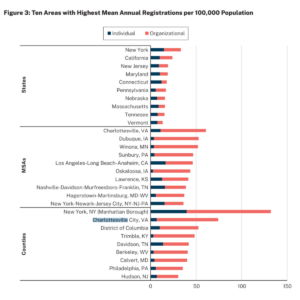The US Copyright Office recently published The Geography of Copyright Registrations, a report from its new-ish Economic Research division. It lays out interesting data about which parts of the country file the most copyright registrations. While registration isn’t a requirement for obtaining copyright, it is a common step for rightsholders who want to monetize those rights. As I read through the report, the chart below jumped out at me—it shows Charlottesville, the little college town where I live, as the city (aka “MSA”) with the most copyright registrations per capita (and the county with the second-most) in the entire country.
There are many amazing artists, musicians, authors, architects, and other creative people in Charlottesville, but more than New York, LA, or Nashville, even on a population-adjusted basis? Looking down the list, you could ask the same about the next three cities on the list: lovely places, for sure, but still, how’d they end up on this list?
The answer is in the other variable represented in that chart: organizational versus individual registrations, represented by red and blue portions of the bar. The vast majority of copyrights in these creative little towns are being registered by corporate copyright holders, not individual creators. And sure enough, Charlottesville is home to a division of legal publishing giant LexisNexis, which churns out dozens of legal reference books, updated regularly (and registered anew) to reflect tweaks in the law. Dubuque, IA, is home to Kendall Hunt, a major K-12 textbook publisher. And Winona, MN, is home to the sheet music publishing giant Hal Leonard. It’s these corporate copyright aggregators, not artist communes, that account for the spike in copyright registrations.
That interesting little detour is a window into a larger truth: many, many copyrights are held by companies, not individuals. As we consider ways to protect artists and encourage creativity in times of technological change, it is important to remember how many copyright owners are not artists or authors, and may be more interested in exploiting the rights they already hold than in fostering the next generation of creativity.
